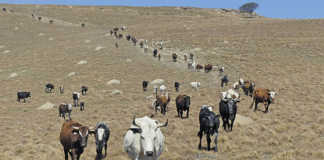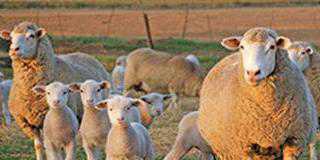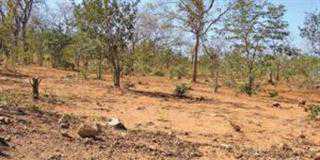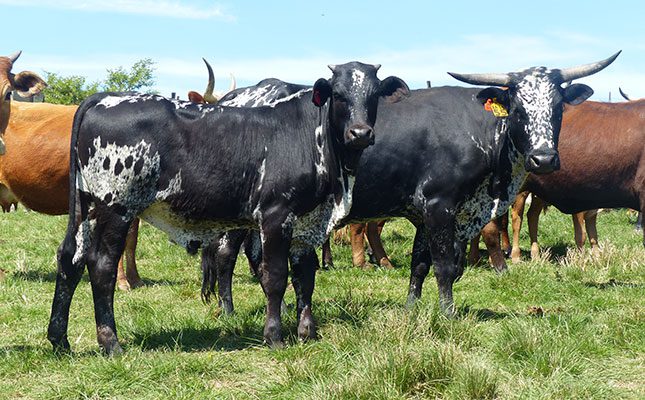
Photo: Mike Burgess
Theo Maqashalala has run purebred Nguni cattle on his farm Blackwood 2 in the Amathole District Municipality of the Eastern Cape since the early 1990s, and is still impressed with their no-nonsense production on the veld.
Five years ago, his decision to introduce Brahman bulls to a portion of his Nguni cows highlighted the latter breed’s value as a dam line for use in terminal crossbreeding programmes.
He says that, as a commercial beef farmer, introducing a terminal crossbreeding programme was the best production decision he’s ever made, adding: “Nothing beats an F1 Nguni-Brahman cross weaner.”
Maqashalala was born in 1937 near Kokstad, KwaZulu-Natal. His father, Meshack, was an Anglican priest who also dabbled in communal livestock farming.
In 1959, Maqashalala enrolled at the University of Fort Hare (UFH) in Alice, Eastern Cape, where he completed what was then a three-year advanced diploma in agriculture, followed by a bachelor of social science degree.
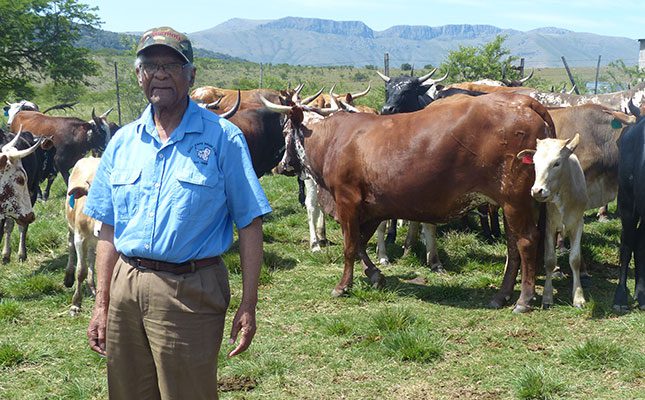
He eventually took up a position as a junior lecturer at UFH, went on to become a professor of social work, and retired from the university in 2000.
During his time at UFH, he became interested in the Faculty of Science & Agriculture, and was even involved in designing some of its course content. He simultaneously began
toying with the idea of running a small herd of beef cattle, and in 1989 acquired a 341ha mixed-veld farm, Blackwood 2, in the Kat River Valley near Seymour, about 62km from Alice.
He started with just 10 crossbred cattle, but was soon convinced of the value of Nguni genetics by members of UFH’s Faculty of Science & Agriculture.
Over the years, Maqashalala has focused on acquiring top Nguni genetics from breeders in the Eastern Cape’s well-known Umsenge Nguni Cattle Breeders’ Group, among others. According to him, breeders’ group member Bushkloof Ngunis, located near Fort Beaufort and owned by Vernon and Julie Sparks, has perhaps had the most potent genetic impact on his herd.
Terminal crossbreeding
Maqashalala produced purebred Nguni weaners successfully for more than two decades. Then, in 2017, he decided to crossbreed two Brahman bulls with some of his Nguni cows.
He found the resultant F1 Nguni x Brahman weaners impressive, especially in terms of their market compatibility. “In my experience, purebred Nguni weaners aren’t always in high demand at feedlots,’’ he explains. “But demand is high for F1 Nguni x Brahman offspring, which have been boosted by hybrid vigour.’’
He adds that Ngunis are ideal for any crossbreeding programme, as the females are fertile, calve with ease, are outstanding mothers, and are known for their long productive lives on the veld.
These traits, he says, are evidenced by the fact that one of his Nguni cows had produced 17 calves by the time she reached 20 years of age.
A central pillar of Maqashalala’s terminal crossbreeding programme is therefore the breeding of replacement Nguni heifers to rejuvenate his herd and keep it productive. To achieve this, he runs two Brahman and two Nguni bulls with his Nguni breeding females all year round.
The vast majority of Nguni females calve between September and March, and achieve a calving rate of 75% on the veld. Bull calves are castrated at seven months old, while the heifers are mated at about 20 months old, according to Maqashalala’s estimates.
Weaners are run with the herd until they are on average 12 months old and weigh between 220kg and 250kg (crossbred heifers and oxen) and 200kg to 220kg (purebred Nguni oxen), at which time they are sent to market.
Management
Since his retirement, Maqashalala has continued to successfully manage his Nguni herd for more than two decades, which is testament to the breed’s reputation for being easy to care for.
He also believes that the Nguni can help to mitigate climate-change challenges in light of its high level of adaptability to Southern Africa’s extreme climate conditions.
“The climate is changing, and no other breed will be able to beat the Nguni in terms of [overcoming] the associated challenges. It’s hardy, heat-tolerant, and browses if need be,’’ explains Maqashalala.
The careful management of his mixed veld and the occasional control of sweet thorn (Vachellia karroo) encroachment have proved crucial to getting the best out of his Ngunis.
The farm is divided into seven camps, all of which have good sources of water. This allows for the non-selective grazing of the veld in every camp by the entire herd.
The length of time the herd is allowed to graze any one camp before being rotated to the next is determined by the type of grass cover, the season, the topography of the camp, and the rate at which the herd grazes the veld down, which is monitored carefully.
Over and above his focus on the meticulous management of his veld, Maqashalala has a comprehensive lick-supplementation regime in place. The herd receives an energy lick from August to October, a phosphate lick from November to March, and a protein lick throughout winter.
Disease control
As the farm is situated in an area affected by redwater, heartwater and gallsickness, Maqashalala treats his cattle with a pour-on dip once a month from October to March.
Annual inoculations for black quarter and anthrax are covered by an Eastern Cape state veterinarian, while Maqashalala himself administers preventative inoculations against contagious abortion, vibriosis, and other diseases.
Despite his age, Maqashalala has no plans to stop farming his Ngunis, as they have been such an integral part of his life for so long.
“I love my cattle,” he says. “They’re my greatest friends.’’
Email Theo Maqashalala at [email protected].








